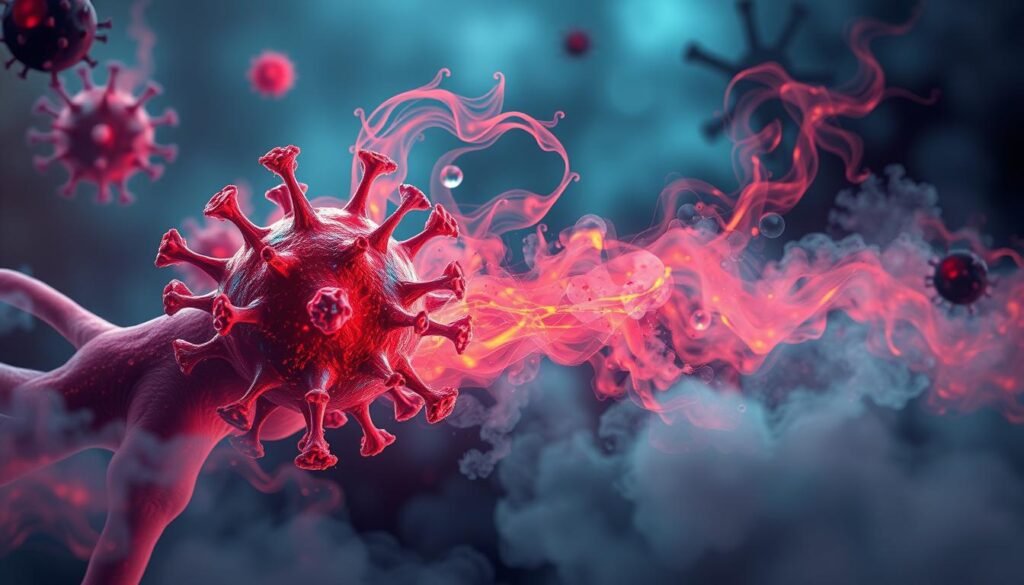Did you know about 50 million Americans deal with allergies each year? Many of them feel constantly tired because of allergy-induced fatigue. This often ignored condition deeply affects daily life and wellness. It’s important for those suffering to understand the links between allergens and chronic fatigue. We will look at the reasons behind allergy-induced fatigue, such as specific allergens, how the immune system reacts, symptoms, how to diagnose it, and ways to ease this tough problem.
Key Takeaways
- Allergy-induced fatigue is a common complaint among individuals with allergies.
- Common allergens include pollen, dust mites, pet dander, and certain food sensitivities.
- Histamine release from allergies can lead to inflammation and persistent tiredness.
- Allergy testing is essential for effective management of symptoms.
- Lifestyle adjustments, such as improving sleep hygiene and nutrition, can significantly reduce fatigue.
- Medications like antihistamines may help alleviate allergy symptoms, including fatigue.
- Regular exercise and hydration contribute to long-term relief from allergy-induced fatigue.
What Is Allergy-Induced Fatigue?
Allergy-induced fatigue is a deep tiredness that doesn’t go away with sleep. It happens when the body’s immune response overreacts to things like pollen, which are usually harmless. This reaction can release histamines and other chemicals. These can disrupt how well you sleep.
Allergy fatigue is more than just feeling tired. It comes with mental fog, irritability, and low motivation. When it gets worse, it can mess with your work and friendships. You might also find yourself more stressed, which only makes the tiredness worse.
Many allergies, like those to pollen, dust mites, and certain foods, can lead to this kind of fatigue. The effects of these allergens hurt both your body and your mind. If you’re always tired, have trouble sleeping, and feel more anxious, you might be dealing with allergy fatigue.
To handle allergy fatigue, you need a plan. This includes avoiding what triggers your allergies, using medicine, and keeping your home clean. Talking to a doctor who knows about allergies is a good step too. With the right care, you can fight back against the tiredness allergies cause.
Understanding Allergy-Induced Fatigue
Allergy-induced fatigue is a big issue for many. The immune system reacts to things like pollen and dust mites. This leads to the release of histamines and other chemicals. These responses cause allergy symptoms such as sneezing and a stuffy nose. They also result in tiredness that affects daily activities.
When you’re exposed to more allergens, histamine levels go up. This makes you feel more tired. Symptoms like a stuffed nose and itchy skin can mess up your sleep. This causes poor sleep quality. Many with allergies find they can’t sleep well. This makes their daytime fatigue worse.
Being around allergens a lot may cause ongoing inflammation. This is connected to long-term tiredness. Studies show that over half of people with allergic rhinitis feel tired. Also, up to 40% of those with allergies have fatigue. It greatly affects their life quality.
Medications for allergies can also make you tired. Managing these symptoms is key to feeling better. If your fatigue is bad or lasts a long time with allergy symptoms, see a doctor. You might need different treatment.
Learning about the link between allergies and fatigue is important. At AFC Urgent Care Clark, you can get walk-in allergy help. They offer relief without needing an appointment.
| Allergy Type | Common Symptoms | Fatigue Connection |
|---|---|---|
| Seasonal Allergies | Sneezing, Itching, Congestion | Commonly triggers fatigue due to disrupted sleep |
| Dust Mites | Persistent Coughing, Sneezing | Prolonged exposure can lead to chronic inflammation and fatigue |
| Pet Dander | Nasal Congestion, Itchy Eyes | Can cause fatigue due to allergic response and sleep disruption |
Common Allergens That Trigger Fatigue
Finding out which allergens cause tiredness is key for those feeling weary due to allergies. Different triggers affect our daily lives and make us feel more exhausted. Knowing what they are can help manage them and boost our energy.
Pollen and Seasonal Allergies
Pollen is a widespread allergen, especially in certain seasons. Allergies from pollen of trees, grasses, and weeds make us very tired. Many feel worse during spring and fall, messing up sleep and making exhaustion worse.
Indoor Allergens: Dust Mites and Pet Dander
Indoor allergens like dust mites and pet dander are common in houses. Dust mites are found in places like beds and carpets. Pet dander is from skin flakes and fur. Being around these allergens often can cause sneezing and a stuffed nose, making you tired all the time.
Food Sensitivities
Certain foods can also make you feel tired. Allergies to things like dairy and gluten cause reactions that lead to being tired a lot. Avoiding these foods can help improve how energetic you feel.
The Immune Response and Its Role in Fatigue
It’s key to know how the immune response works. This helps us see why allergies can make us feel tired. When the body meets allergens, it gears up its defense system. This leads to actions that might affect how good we feel. One major response is making histamine, which is big in causing symptoms like being tired.
Histamine Release and Inflammation
Allergic reactions make your body release histamines. These chemicals cause swelling as a defense against allergens like pollen, dust, and animal fur. This swelling can make it hard to breathe and feel comfy. It can make you feel worn out because breathing is tough or you’re using more energy. If this swelling keeps up, you’ll likely feel even more tired, starting a hard cycle to stop.
Brain Fog and Cognitive Impairment
Besides feeling physically tired, allergies can cause brain fog. This means feeling confused, forgetting things, and not thinking as sharply. Brain fog can really get in the way of getting things done and mess up daily activities. It’s tough to stay focused or think straight. This shows how important it is to handle allergies well to avoid these brain issues.

| Effect | Description |
|---|---|
| Histamine Release | Triggers inflammation leading to various allergy symptoms. |
| Increased Inflammation | May restrict airflow and increase fatigue levels. |
| Brain Fog | Characterized by confusion and forgetfulness affecting daily tasks. |
| Cognitive Impairment | Can reduce mental clarity and productivity. |
Symptoms of Allergy-Induced Fatigue
Knowing the symptoms of allergy-induced fatigue is crucial. Those with allergies may face symptoms that hurt their sleep and daily life. This issue affects their daily activities greatly.
Persistent Tiredness
Persistent tiredness is a common symptom. It can hit someone no matter how much they sleep. Nasal congestion and sneezing can mess up a good night’s sleep. This leads to feeling tired and having low energy all day.
The body fights allergens like pollen or dust mites, making one feel exhausted. It’s hard for people to stay awake or concentrate. This tiredness comes from the body reacting to allergens and messing up our sleep patterns.
Impact on Daily Life and Activities
Allergy-induced fatigue can really change how someone lives their day. It can make people join less in work or fun activities. This can hurt their overall happiness in life.
People may struggle to finish work or have fun with others. Getting better from these symptoms can make someone’s energy and happiness better. It’s important to deal with these signs for a better life.
Diagnosis: Identifying Your Allergens
Identifying the root allergens is crucial to managing allergy-induced fatigue. A clear diagnosis lets people customize their treatment plans. Allergy tests are key to this, leading to better solutions for each person’s unique allergy issues.
Importance of Allergy Testing
Allergy testing helps figure out which allergens cause problems. Knowing this allows doctors to give targeted treatments. This can make a big difference in lessening allergy fatigue and boosting life quality. For more help, check the resources from Allergy & Asthma Network.
Types of Allergy Tests Available
There are different ways to test for allergies. Each method aims to find what triggers allergic reactions. Below are common tests:
- Skin Prick Tests: Small amounts of possible allergens are put on the skin to see if there’s a reaction.
- Blood Tests: These tests check how the immune system reacts to certain allergens through a blood sample. They’re useful if skin tests aren’t possible.
- Elimination Diets: People stop eating foods they might be allergic to. Then, these foods are slowly added back to see if there’s a reaction.
- Patch Tests: These tests look for skin reactions to allergens. They’re mainly used to find causes of contact dermatitis.
By using these testing methods, people can get a detailed diagnosis of their allergies. This lets them effectively manage their allergy symptoms and reduce fatigue.
Management Strategies for Allergy-Induced Fatigue
Managing allergy-induced fatigue involves a multi-faceted approach. This includes effective medications and long-term solutions like immunotherapy. Many individuals with allergy symptoms often feel very tired. Exploring various management strategies is essential to improve their well-being.
Medications: Antihistamines and Decongestants
Many people use antihistamines to fight allergy effects. Non-drowsy formulas are great, letting individuals keep up with daily tasks without feeling sleepy. These medications block histamine effects. This reduces symptoms like sneezing, nasal congestion, and itchy eyes.
Decongestants can be paired with antihistamines for relief. They help ease sinus pressure. This makes people feel more comfortable and less fatigued.
Immunotherapy Options
Immunotherapy is a long-term solution for relief. It gently exposes patients to allergens to increase tolerance over time. Allergy shots or sublingual tablets can cut down body’s reactions to irritants. This means fewer symptoms and less fatigue.
By tackling the root of allergies, immunotherapy changes the game. It’s a powerful way to handle allergy-induced fatigue effectively.
Lifestyle Adjustments to Reduce Fatigue
Making changes to your lifestyle is key to fighting allergy-induced fatigue. By improving different aspects of their lives, people can boost their energy and feel better overall.
Improving Sleep Hygiene
A regular sleep schedule helps with better sleep hygiene. It’s important for adults to get seven to eight hours of good sleep each night. If you have sleep apnea, using a CPAP machine can help you sleep more soundly. A calm, dark sleeping area is also essential for reducing fatigue and getting deep sleep.
Diet and Nutrition for Allergy Relief
Eating right is crucial for handling allergy symptoms. A diet full of anti-inflammatory foods helps lessen fatigue and keeps your blood sugar steady. This means you won’t feel tired during the day. Adding foods high in iron is important, especially for women, to avoid anemia. People should also look into nutrition plans that meet their individual needs.
Regular Exercise and Hydration
Regular physical activity boosts your energy and immune system, even if you’re a bit tired. Drinking enough water all day is also crucial, as not having enough can make you sluggish. Choosing to stay active and hydrated helps build a strong lifestyle that fights allergy effects.

Combatting Allergy Fatigue with Environmental Controls
Managing allergy fatigue requires smart changes in your home environment. These changes help reduce contact with allergens. With these steps, you can feel better and live healthier.
Creating Allergen-Free Zones at Home
Setting up allergen-free areas, especially in sleeping spaces, makes a big difference. It is important to avoid dust, pet fur, and mold in these areas. Here’s how you can make it happen:
- Utilizing hypoallergenic bedding and pillow covers.
- Removing carpets and heavy drapes that can trap allergens.
- Regularly cleaning and decluttering living areas.
- Establishing a no-pets policy in designated rooms.
By taking these steps, you create a healthier space for rest. This can greatly improve your sleep and wellness.
Using Air Purifiers and Dehumidifiers
Adding air purifiers and dehumidifiers to your home can clean the air. Air purifiers capture airborne allergens like pollen and pet dander. Dehumidifiers reduce moisture, which stops dust mites and mold from growing.
Below are their benefits:
- Air purifiers clean the air from allergens.
- Dehumidifiers keep humidity levels perfect, between 30-50%.
- Both gadgets make your home healthier and reduce allergy issues.
Long-Term Solutions and Preventative Measures
Combating allergy-induced fatigue requires long-term strategies and preventative actions. Finding out what triggers reactions and making life changes can greatly boost well-being. This section outlines ways to better manage and reduce symptoms.
Identifying Triggers through an Elimination Diet
An elimination diet is key for finding what foods may worsen allergy fatigue. It involves cutting out possible allergens, then slowly adding them back in. This helps figure out which foods harm your energy and health.
Behavioral Changes to Support Immune Function
Making changes in behavior can improve your immune system and fight allergy fatigue. Regular exercise and a healthy diet are extremely important. Also, practicing stress-reduction techniques, like mindfulness, helps your body deal with allergens better. These steps not only relieve symptoms but enhance your overall health too.

Consulting Healthcare Professionals
Getting advice from healthcare pros can really help with allergy fatigue. Allergy experts have the know-how and tools for right diagnoses. They make plans that really fit each person’s allergy issues.
Working with Allergists and Specialists
Allergists are key in finding what sets off allergy fatigue. They do tests to figure out the exact allergens, like pollen or certain foods. Working with other experts, they create a full plan to make health better.
Importance of Personalized Treatment Plans
Having a plan meant just for you is crucial in handling allergies. Since everyone’s allergies and life are different, plans need to be unique. These plans might mix medicine, new lifestyle habits, and diet changes for better health.
When to Seek Help for Allergy-Induced Fatigue
Knowing when to seek help for allergy fatigue is very important. If you’re always tired and have other allergy signs, see a doctor. Figuring out how severe and frequent your symptoms are can help decide if you need medical help.
Understanding Severity and Frequency of Symptoms
Allergy fatigue can make you feel really tired and give you headaches or migraines. A study showed people with allergies often feel more tired than others. This tiredness is usually because of histamines from allergic reactions, which mess up your sleep and can make it hard to think clearly.
If you’re extremely tired, sneezing a lot, or your eyes are itchy and watery, it might be time to get some help. An allergist can make a treatment plan just for you. This could include allergy shots or immunotherapy, which might make you feel better over time.
When home treatments don’t work and you still feel tired, you should get professional help. Places like AFC Urgent Care Cedar Grove offer fast help from doctors. They can give you advice on how to handle your allergy fatigue better.
Conclusion
It’s key to understand allergy fatigue to feel better overall. When the immune system sees harmless stuff as dangers, it leads to allergy fatigue. This can really change how you feel every day. People with allergies, especially those with nasal allergies and asthma, often feel very tired. That’s why it’s important to manage this fatigue well.
To have more energy despite allergies, knowing what triggers them is step one. Making changes in your life can also help. By improving how you sleep, eating healthy, and being active, you can boost your energy. Getting advice from professionals can help you manage your symptoms better. This will make your life more enjoyable.
If you need more help with fatigue and allergies, check out natural remedies for adrenal fatigue treatment. Finally, understanding and actively managing allergy fatigue can lead to a livelier and more active lifestyle.